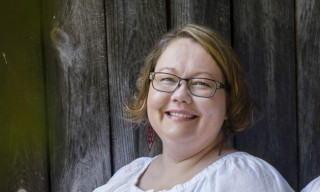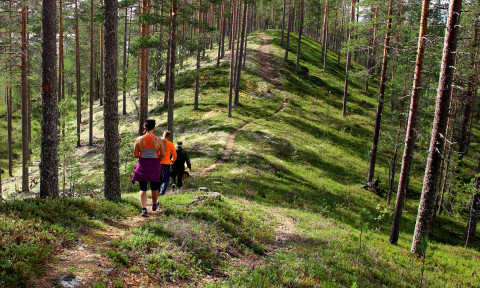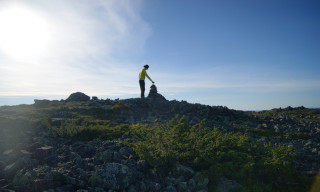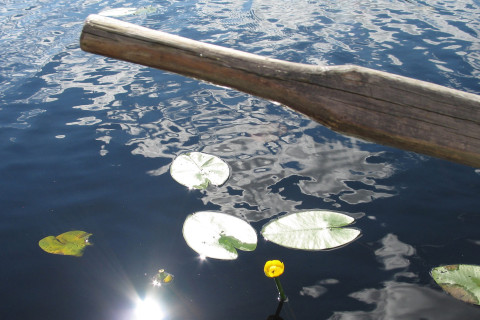Tourists are learning to demand that tourism services and tourism products should be produced responsibly. How is responsibility visible in the everyday choices made by tourists and hotel entrepreneurs?
- Text Risto Löf | Photos Raija Törrönen, KuviaSuomesta.fi, Johanna Kokkola
In tourism, responsibility is visible in a number of details. When Helena Puhakka-Tarvainen and Maria Saastamoinen started their Karelian-inspired apartment hotel Lietsu in Joensuu in 2019, they paid close attention to material choices and food waste, among other things.
“When our hotel rooms were designed, we took into account recycling stations and the energy efficiency of lighting, and we prefer glass instead of plastic in our materials, for example. The hotel’s interior is decorated with recycled objects such as old, renovated chairs and traditional textiles. During construction, we favoured local entrepreneurs and we still try to highlight our Karelian values in our everyday life, as well as through our partnerships. In addition, our values have guided the recruitment of our staff. In our day-to-day activities, we reduce food waste on the basis of, for example, a checklist of raw materials we have in the kitchen, and we lend bicycles to our customers,” Puhakka-Tarvainen says, listing the hotel’s practical measures.
Responsibility became an inherent part of tourism entrepreneurship, and it is also written into the company's values. The two entrepreneurs’ background also explains where they are coming from: Puhakka-Tarvainen is a trained biologist and Saastamoinen holds an MSc in technology.
“In our hotel, responsibility stems from who we are. Our value base motivates responsible tourism. It wouldn’t be natural to build a business that contradicts our own values. Responsibility is not as difficult as people often think. It isn’t always more expensive either, but it can be even cheaper, better and more straightforward,” Puhakka-Tarvainen says.
In our hotel, responsibility stems from who we are. Our value base motivates responsible tourism.
Helena Puhakka-Tarvainen, entrepreneur
Apartment Hotel Lietsu

Regenerative tourism is a combination of economic, ecological and cultural responsibility
Responsibility in tourism has become a major topic of discussion both among tourism businesses and tourism researchers. Tourists are also gradually learning to demand responsibility.
“And when tourists’ choices are responsible, they also lead to sustainable tourism,” Research Manager Juho Pesonen says. Pesonen works as Research Manager for Digital Tourism Business and he is Director of the International Master's Degree Programme in Tourism Marketing and Management at the University of Eastern Finland's Business School.
“Responsible tourism starts from the idea that we should travel in such a way that future generations will have similar – or even better – opportunities to travel,” Pesonen says.
The theme is broad and Pesonen splits it into smaller components: responsibility in tourism can be examined from the perspective of the well-being of businesses, the well-being of nature, and the well-being of people and society. These perspectives are easily seen as conflicting or even contradictory, but in a best-case scenario, economic sustainability also means environmental and sociocultural sustainability.
“Regenerative tourism, i.e. tourism where products and services are produced while taking all three perspectives into consideration, is a difficult challenge to tackle. Yet, that is exactly what our research group is trying to achieve.”
The success of tourism is often measured in euros left by tourists to local communities, but at the same time, tourists are also heavy users of regions’ own resources. For example, a tourist may use much more water than a local resident. This is where Pesonen would like to see a conscious balance.
“We must acknowledge that as tourists we have an impact on local communities. When we spend money on local restaurants, culture, handicrafts and hotels, we pay back the local community’s hospitality. But if money spent on tourism goes to companies in tax havens, it doesn’t benefit locals.”
The more responsible the tourism industry is, the more profitable it should become.
Juho Pesonen
Research Manager for Digital Tourism Business

One doesn’t even have to look abroad to see the positive effects of tourism, since the phenomenon is visible in Finland, too. Thanks to summer cottages and tourists visiting them, many small Finnish towns offer a considerably higher level of service than they otherwise could.
Pesonen is confident that the capitalist social system will eventually provide the means and solutions to make sustainability and responsibility in tourism profitable for businesses and regions – and more importantly, the more responsible the tourism industry is, the more profitable it should become. In this equation, tourists wouldn’t even have to make a compromise on their tourism experience; instead, responsibility would mean better quality and more memorable experiences.
The attraction of tourism is never-ending. It has become an integral part of Western culture. Already people living in the ancient Rome knew that travelling broadens the mind.
“It is astonishing how little the basic idea of tourism has changed in 2,000 years. In ancient Rome, tourism was a way for the upper classes to educate themselves. People travelled to major sports events and visited attractions, just like they do today. Tourism is something that comes very naturally to people; it satisfies our curiosity. For millennia, letters and cards have been sent home from journeys. This still happens, only the technology has changed,” Juho Pesonen says.
Tourism helped to integrate the vast empire of Rome, and tourism continues to play a socially important role: it helps “us” to understand “others”. Tourism is also strongly based on social structures, because without publicly funded roads and railways, there would be no tourism either.
“Society feels that it is worth investing in tourism because it brings many benefits to society. For example, building the Tallinn-Helsinki tunnel would have a huge impact on Finnish tourism: it would be possible for Finns to catch a night train to Central Europe.”
Tourism also expresses a specific wealth and way of consumption. Traditionally, exotic getaways have been a way for the upper classes to escape their everyday life. Today, around 10% of the world’s citizens are potential tourists outside their own country, and technological advances are increasing this percentage.
“Those who have the opportunity to travel in terms of time, money and regulation are still the wealthiest people in the world. This social dimension has always been present in tourism,” Pesonen says.
The unique nature of tourism characterises tourism-related consumption. In China, for example, people may save up for a whole year so that they don’t’ have to worry about money on holiday.
“Tourism as a service product is very special: It can't be tested in advance. The success of an entire holiday may depend on whether you choose the right hotel. Moreover, you can’t return a tourism product even if the sun doesn’t shine or you get stuck with loud neighbours in your hotel. All you can do is hope for better luck next year.”
Nudging tourists towards making responsible choices
Already now, tourists are guided in a responsible direction by tourism businesses’ own responsibility communication and by certificates ensuring the sustainability of products.
“For example, a German tour operator may require Finnish tourism services to have certain certificates, which are used to demonstrate to tourists and partners that the entire tour is responsibly organised, from start to finish, including the whole supply chain,” Pesonen explains.
Tourism businesses should invest in responsibility communication, because when making a choice between two equally strong tourism products, the consumer will usually choose the one that is more responsible.
“Responsibility communication is a way for tourism businesses to tell what they are doing in terms of sustainable development and responsibility. In addition to providing information, communication can guide consumers towards more responsible consumption, and it can influence the image and brand of the company,” says Project Manager Katja Pasanen from the Business School. She is currently writing her doctoral dissertation on responsibility communication.
According to Pasanen, among the recent tools in responsibility communication is nudging, which has proven effective in guiding consumer behaviour.
“There are also ways to nudge customers without using words. For example, a hotel can switch its breakfast plates to a smaller size in order to reduce food waste. And then there are ways of encouraging responsible choices through communication. For instance, customers can get a drink ticket when they make a choice that saves the environment. Nudging has led to a lot of good results, such as reductions in hotels’ room cleaning requests and food waste. The customer experience becomes more positive when the customer is taken into consideration in the process.”
Responsibility communication has become an international area of research in the past ten years. The trend has also been followed in Finland, and research into responsibility communication began at the University of Eastern Finland’s Business School in 2018.
“Back then, problems relating to the sustainability of tourism started to emerge. At the same time, Visit Finland began to develop the Sustainable Travel Finland programme for tourism businesses and regions. Today, responsibility communication is being developed as one area of responsible tourism in a number of projects in Finland,” Pasanen says.
The importance of responsibility communication is gradually starting to be understood, but there are also challenges with regard to, e.g., companies’ communications resources and how to formulate messages so that they catch the consumer’s eye and inspire action.
“Many Finnish tourism businesses act responsibly but do not necessarily inform their customers about it online. Consuming has largely moved to the digital world and, if a tourist cannot find the information they are looking for on a company's website, they’ll move on to the next company.”

Slow travel and staycations are trending
Consumers, too, must learn the art of responsible tourism. Although many alternatives are permitted and available, it is up to each and every tourist to take sustainability and ethical aspects into consideration. The most important choice is, of course, the mode of travel.
“Air travel will always be the Achilles’ heel in tourism. If air travel were carbon neutral, tourism would be one of its best sectors. Tourism is also linked to a variety of societal mechanisms, such as the employment of young people in developing countries and the protection of biodiversity and wildlife.”
There’s been a reduction in air travel due to the coronavirus pandemic, but already before, people were talking about “flight shame”. In Sweden, lively debate around the matter has had a real impact on travel behaviour: many passengers have switched from flying to travelling by rail.
As a result of the travel restrictions imposed due to the coronavirus pandemic, staycations are experiencing a new boom. Rental cottages and national parks have been exceptionally crowded during the pandemic, and there's been an unprecedented spike in the sales of camping, cycling and boating gear.
“People are investing in staying at home and close to home. Hopefully, this will build a longer, interactive relationship with the markets that are closer to tourism companies and destinations. Those tourist groups that have now saved the industry must not be abandoned later on,” Pesonen points out.
Slow travel has become a phenomenon among tourists. It is based on the idea that the journey itself is an experience, rather than just a way of reaching the destination.
“The time spent en route to the destination can be a memorable experience and an opportunity to meet new people. The escape from everyday life starts the moment you leave home,” Juho Pesonen says.
People’s interest in slow travel is growing, according to Veera Riikonen’s Master’s thesis in tourism marketing and management. Instead of flying, tourists opting for slow travel prefer trains, buses, ferries and ships.
According to Riikonen, slow travel is related to climate concerns over the effects of air travel. In slow travel, people are encouraged to travel more slowly to their destinations, to favour public transport, to stay longer and, overall, to travel less.
Riikonen analysed Facebook posts and comments in a group dedicated to slow travel. In those, both efficiency and fun were highlighted: on one hand, travel costs and minimising travel time were considered the most important factors, while on the other hand leisure time and fun were considered part of the journey. According to Riikonen, the findings indicate that the environmental and climate impacts of tourism were, however, secondary to the efficiency and comfort of the mode of travel.
When the pandemic subsides, is there a way back to normal?
During the pandemic, many have hoped for things to get back to normal. But can we return to what used to be normal in tourism, or will some things be different for good?
“When travel restrictions eventually are lifted, an enormous potential will be released. There’s a huge urge to travel. To me, it seems that the entire ecosystem is trying to get back to the old normal. On the other hand, the pandemic has lasted for so long that it will change our habits. It’s a chance to start over and to try new things,” Pesonen says.
The pandemic has already changed the game: railway tourism has seen new investments, and, for example, cruise ships have been banned from entering the city centre of Venice.
Pesonen believes that we’ll be seeing new travel-related openings and innovations in the next 5 to 10 years. At the same time, the tourism industry is developing its resilience to cope with similar crisis situations.
“As a result of the pandemic, it is necessary to think about how entire national economies can become less dependent on tourism. A large share of the GDP of many Mediterranean countries, for example, comes from tourism. New Zealand, on the other hand, has already reformed its tourism strategy. Now, the focus is on local tourists.”
Tourism has an enormous positive potential if its negative effects can be balanced out over a certain period of time.
Juho Pesonen
Research Manager for Digital Tourism Business



